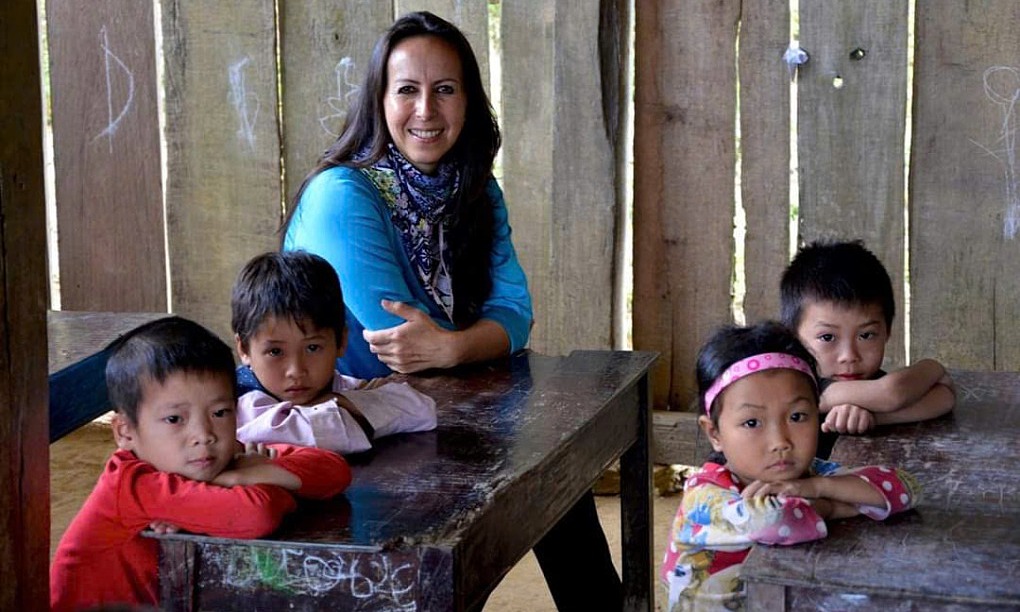French-Vietnamese Woman Returns to Aid the Poor in Her Mother's Homeland

A Journey of Healing and Giving Back
Isabelle Paulette Muller had lived with the pain of abuse and stigma for years, but everything changed when she accompanied her mother to Vietnam to rediscover her heritage. The journey marked a turning point in her life, leading her to reconnect with her roots and dedicate herself to helping others.
As they stepped off the plane at Noi Bai Airport in Hanoi, Isabelle gripped her mother Loan’s hand, feeling the weight of a new beginning. The heat and noise were overwhelming, but beneath the initial discomfort, she sensed something familiar. It was 1990, and this was her first visit to Vietnam. The immigration officer stamped her tourist visa with a red seal, reminding her that she was only a visitor in the land her mother called home.
The unwelcoming atmosphere quickly faded when they arrived at the hotel and enjoyed a steaming bowl of pho. The aroma of cinnamon and star anise brought back memories of stories her mother had told in France. “If it tastes like home, then we are home,” Loan said, and from that moment, Vietnam felt alive. This experience set Isabelle on a path of rediscovery and giving back to her mother’s homeland.
Born in a small village in Tours, France, Isabelle was the youngest of five siblings. Her mother had left Ha Tinh, Vietnam, in 1955, joining her father, a former French soldier who had fought in Indochina. After returning home, he struggled with psychological trauma. The family lived in poverty, and Isabelle faced prejudice from neighbors.
“I was an outcast in French society,” she recalls. School was her only refuge, but it did little to ease the pain of being sexually abused by her biological father for nine years. With no escape but silence, she attempted suicide twice, once at 13 and again at 17.
After university, she moved to Germany, working as an interpreter and meeting her husband, a technology entrepreneur. She eventually saved enough to take her mother, Loan, to Vietnam, driven by her mother’s stories of their heritage. One of her goals was to see if Vietnamese people shared her mother’s resilience in the face of hardship.
During the trip, they reunited with Loan’s younger brother, Le. Isabelle saw thatched-roof houses and lush rice fields for the first time. A cousin picked pineapples for her and climbed a coconut tree to get her fresh coconut water. The warmth of the people made her feel she truly belonged. Step by step, she began to feel deeper love for this country.
Loan passed away in 2003, leaving a wish to build as many schools as possible for poor children in Vietnam. Isabelle promised to fulfill it. “She wanted equal educational opportunities for all children,” she says. She also wanted to give back to Vietnam, a place that had given her the affection she needed to heal after a traumatic childhood.
In May 2016, Isabelle established the Loan Foundation. Over nine years, it undertook more than 48 projects, including scholarships for disadvantaged students and orphans, building boarding houses and kitchens, and supporting disaster relief. Funding came from individual donors, international organizations in Europe and Vietnam, and royalties from her books.
“I don’t want these children to see me as a rich ‘western woman’ who only hands out money. My efforts will mean nothing if they don’t recognize the value of education.”
On trips to the highlands, Isabelle met children asking for $5 each time someone took their photo. She realized financial aid and scholarships were not enough to bring lasting change, as traditions, family pressure, and social norms often caused children to drop out of school or marry early.
Four times a year, she flies to Vietnam to join awareness classes, counsel children, and help them plan their futures. She draws inspiration from teachers in remote villages who cross forests and muddy roads to reach school.
The results of her efforts became evident in children like Ma Thuy Thuy, born into a poor farming family. Her parents once forced her to quit school to work in the fields, and so she ran away to Hanoi by bus. With support from the Loan Foundation, she was admitted to East Asia University of Technology to study food technology.
Sung Thi My, 22, from the Dong Van Karst Plateau in Ha Giang, was also on the verge of dropping out four years ago due to poverty. Isabelle reached out when My was in 12th grade at Ha Giang’s boarding school for ethnic minority students and encouraged her to continue.
“She was the light at the end of a dark tunnel,” My says. She works part-time in a hotel in Hanoi’s old quarter and is set to graduate from the Hanoi University of Commerce in 2026.
Vu Yen, Isabelle’s colleague at the Loan Foundation, praised her dedication to children in the northern mountains. For every school-building project, Isabelle travels over 10,000 kilometers from Germany to personally oversee the work, even in dangerous locations on mountainsides or deep in remote areas. When roads are too slippery for cars, she rides a motorbike or walks with the team. Isabelle visits disadvantaged children at home to listen to their stories.
“I’m impressed by her belief that children are pieces of a puzzle that helps shape the world,” Yen says.

Comments
Post a Comment